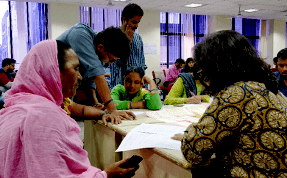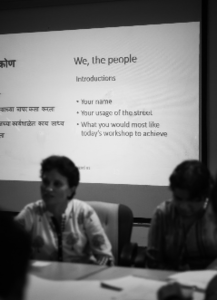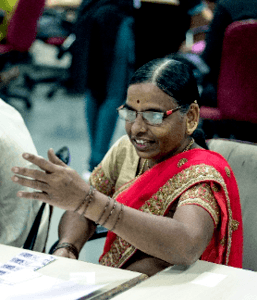Making Public Deliberations Inclusive with Mixed Methods AR
Public participation in contentious issues like streets space usage often results in arguments, excludes the poor and marginalized, and is poorly designed. As a result useful ways forward don’t evolve or they happen too late to affect decisions. Sanskriti Menon and colleagues asked a different set of questions:
How could our public deliberations become:
- Inclusive of diverse people, representing different walks of life
- Egalitarian spaces for fair, reasoned, discussion, with time for participants to listen to diverse views, develop and weigh options and prioritise ways forward.
- Influential in the city’s public decision-making!
 Such deliberations occur, but mostly in industrialized countries. So would they work in Indian cities? Finding this out was the core of our action research project.
Such deliberations occur, but mostly in industrialized countries. So would they work in Indian cities? Finding this out was the core of our action research project.
Before the public deliberation, we interviewed experts, ran a public survey on what people think about and expect from participatory processes, and oriented facilitators. Then the second part of our exploration focused on what we had learned using these mixed methods, and their impact.
 Our public deliberations focused on street usage. The mixed method action research was challenging, but also rewarding. At one point he local government withdrew from anchoring the deliberations, but as a civil society organisation, we took it on ourselves, partnering with other civic groups.
Our public deliberations focused on street usage. The mixed method action research was challenging, but also rewarding. At one point he local government withdrew from anchoring the deliberations, but as a civil society organisation, we took it on ourselves, partnering with other civic groups.
Participants had disagreements and power imbalances, but also sought and found common ground. Broad aspirations and needs for neighbourhood streets emerged, as well as prioritised ways to address them.
The action research changed perceptions about public participation, and was a significant learning experience for the participating public, NGOs, the facilitators and researchers. As one facilitator said, “the deliberation process was almost like a civilized parliament where all citizens had a common goal, despite differing means”.
 The transformative nature of the action step was enhanced by our mixed methods approach. We’ll continue, as one of our ARJ reviewers suggests : “to explore more the useful contribution that AR has made as you look at grand societal challenges”.
The transformative nature of the action step was enhanced by our mixed methods approach. We’ll continue, as one of our ARJ reviewers suggests : “to explore more the useful contribution that AR has made as you look at grand societal challenges”.
This video by Jonathan Shapiro Anjaria depicts the site of one of the public deliberations arranged as part of the action research.
We invite you to learn more about this experience by reading our article HERE. Free 15-day access is available for this article beginning 26 October.
After you’ve had a chance to read this piece, please share your thoughts, ideas, or experiences with our community in the comments section so we can continue this discussion!
- Making Public Deliberations Inclusive with Mixed Methods AR - October 26, 2020
- Participatory action research with Aboriginal Elders: Ngulluk Koolunga Ngulluk Koort project - October 12, 2020
- Bringing the relational self to ART: Interview with Dr. Yvonne Skipper - October 1, 2020
